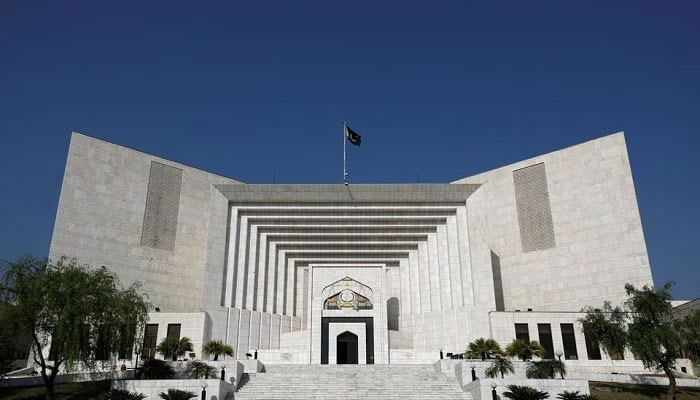[ad_1]
Islamabad: The Supreme Court Constitutional Justice Judge Nyem Akhtar said on Tuesday that the path of civilians in military courts is not against international policies.
His comments came during an investigation into an internal-court appeal against civilian military tests.
The seven-member Constitutional Bench, led by Justice Amin-Udin Khan, heard the internal court appeal against civilian military tests, during which senior lawyer Salman Akram Raja presented arguments on behalf of Arsham Junaid.
Last year, the Supreme Court’s Constitutional Bench 85 was granted conditional permission to declare judgments in cases involving the suspects – May 9, 2023, May 9, 2023.
In the order of inquiring against civilian military investigation, the Constitutional Bench and the Military Court’s rulings said that the High Court’s verdict would be conditional for the pending cases.
Later, military courts for engaging in May 9 demonstrations imposed two to 10 years of “severe imprisonment” to 85 BTI activists, indicating the results of trials for military detention on military installations and monuments.
In January 9, the military has accepted the mercy request of 19 out of 67 convicts in the “Humanitarian Ground” in the May 9 riot case, according to the Service (ISPR).
On October 23, 2023, a five -member bench verdict, after acknowledging petitions to challenge the public’s inquiry into the May 9 riots, announced the public and the public trials in the military courts.
During today’s hearing, the king argued that military tests violated the fundamental rights of the public and that they were contrary to international standards for fair tests and that they need open, independent and transparent actions.
He said that globally, military tribunal verdicts could be challenged in public courts and that many countries forced them to reform their military investigation by citing the European court ruling.
During the hearing, Justice Jamal Mandogal questioned the consequences of violating international policies. In response, the king said that it was not fair that the failing to adopt international standards. Judge Mandokail further inquired about the impact of such violations, and that the king replied that some international policies were binded, and there were no others.
Referring to Article 10 of the Constitution, the king argued that the right to a fair hearing in the constitution was added to the policy of international policies. Judge Afghan, however, said there was no open prohibition on the court in international law.
In the UK, the king said that military tests are overseeing by independent judges rather than soldiers. He recalled past judicial procedures in Pakistan, where civil officials such as deputy commissioners and Tehsildars were authorized to conduct criminal tests, led to the argument that if possible, the military officers could be able to conduct tests.
In addition, the king referred to a United Nations Human Rights Council report, saying that Pakistan’s military courts were not independent and urged the government to grant bail to military custody.
Later, the trial was postponed after the lawyer completed his arguments.
[ad_2]
Source link














